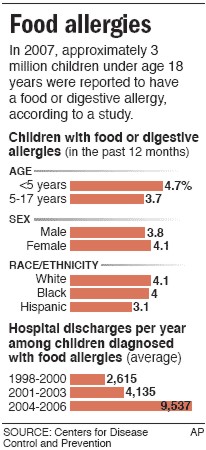Education Experts Share Ways of Developing Food Allergy Policies for Schools
 June 18, 2009
June 18, 2009  Kyriaki (Sandy) Venetis
Kyriaki (Sandy) Venetis  Graphic courtesy of achooallergy.com.
Graphic courtesy of achooallergy.com.
ALEXANDRIA, Va.- Witnessing the number of school age children with food allergies increase “dramatically” over the last decade, “schools now have a critical role to play in preventing medical emergencies as well as responding to such emergencies,” said Brenda Z. Greene, director of school health programs at the National School Board Association, Alexandria, Va.
Ms. Greene gave her comments during the second session of the School Nutrition Foundation’s three-part webinar series. In this second session dealing with food allergy management policy making, Ms. Greene added that, “policy is the underpinning of the government in the local school districts and schools.
“The 15,000 school boards across the country are governed by the policies they adopt, which must comply with federal, state, and local laws.”
Ms. Greene though cautioned, saying, “We learned that one size does not fit all and policy needs to protect, but it also needs to be flexible. Local conditions and capacities vary.”
As part of developing policy strategies that can be incorporate into school districts around the country, the NSBA is working with the Division of Adolescent School Health at the U.S. Centers for Disease Control and Prevention, as well as The Food Allergy & Anaphylaxis Network.
The DASH website contains information relating to areas including:
- symptoms of food allergies.
- treatment of food allergies.
- a school health policies and programs study.
- a health education curriculum analysis tool.
The FAAN website contains information relating to areas including:
- common food allergens.
- anaphylaxis.
- schools and childcare.
- recipes.

Ms. Greene added that more information relating to food allergy policies on a national scale could be found on the U.S. Department of Education website. This site doesn’t contain a food allergies section, but a lot of information on federal policies and positions can be found by typing food allergies into the ‘search box.’
Ms. Greene further added her view that, “adopting policies establishes accountability. Once adopted, they are essential information sources for employees, students, families, and the community at large to learn about how a particular issue or topic is addressed.”
Last year, Rhode Island took the initiative to begin addressing food allergies in schools by enacting the Peanut/Tree-Nut Allergy Law, which can be viewed by scrolling down on the Thrive- Rhode Island’s Coordinated School Health Program website to August 2008.
Elizabeth Bugden, a consultant with the Rhode Island Department of Education and Kids First, commented about the benefit of the law during the webinar, saying, “It has provided a safer environment for students and staff with food allergies. It also provided us with the opportunity to facilitate and bring coalitions together, such as parents, nurses, physicians, and food manufacturers.”
To learn about available resources for policy development and implementation, Ms. Bugden suggested that interested parties read the USDA’s Accommodating Children with Special Dietary Needs in the School Nutrition Programs.
From a more local perspective, Cheryl Peil, food service director of the Elmbrook School District in Wisconsin, said, “In the past eight years, we have had an increased occurrence of food allergies among our school districts, and allergies have created new concerns for us.
“We decided to start to deal with this by creating allergy policy guidelines. The first steps that we took were to identify a core team, which consisted of members of the district, schools, parents, medical professionals, food and nutrition staff members, and other individuals as need.”
Ms. Peil went on to say, “As part of our guidance, we developed a structure where different individual are responsible for certain things, and we developed checklists for them to make sure they know what their responsibilities are and meet those obligations.
“Teacher, for example, are required to make contact with the parents of children with food allergies and inform them of the policies of the school. The teachers are also required to make sure that their rooms are safe for a child with food allergies. Our policy has been in place since 2006, and our manual has been a very good resource.”
